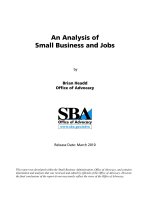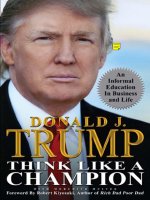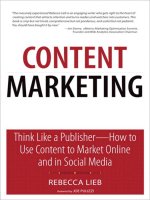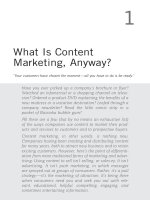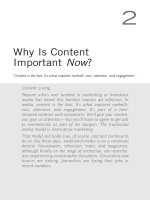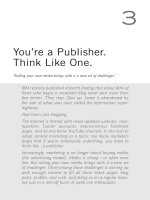Think like a champion an informal education in business and life by donald j trump with meredith mciver
Bạn đang xem bản rút gọn của tài liệu. Xem và tải ngay bản đầy đủ của tài liệu tại đây (717.59 KB, 220 trang )
THINK LIKE A
CHAMPION
This page intentionally left blank
THINK LIKE A
CHAMPION
An Informal Education
In Business and Life
DONALD J. TRUMP
with MEREDITH MCIVER
Copyright © 2009 by Donald J. Trump
Published by Vanguard Press
A Member of the Perseus Books Group
All rights reserved. No part of this publication may be reproduced,
stored in a retrieval system, or transmitted, in any form or by any
means, electronic, mechanical, photocopying, recording, or otherwise,
without the prior written permission of the publisher. Printed in the
United States of America. For information and inquiries, address
Vanguard Press, 387 Park Avenue South, 12th Floor, NYC, NY 10016,
or call (800) 343-4499.
Designed by Pauline Brown
Set in 12 point Bembo
Library of Congress Cataloging-in-Publication Data
Trump, Donald, 1946–
Think like a champion : an informal education in business and life
/ Donald J. Trump with Meredith McIver.
p. cm.
Includes index.
ISBN 978-1-59315-530-8 (hardcover : alk. paper)
1. Success in business. 2. Success. 3. Success in business—United
States. 4. Success—United States. I. McIver, Meredith. II. Title.
HF5386.T814772 2009
650.1—dc22
2008055919
Vanguard Press books are available at special discounts for bulk purchases in the U.S. by corporations, institutions, and other organizations. For more information, please contact the Special Markets
Department at the Perseus Books Group, 2300 Chestnut Street, Suite
200, Philadelphia, PA 19103, or call (800) 810-4145, ext. 5000, or
10 9 8 7 6 5 4 3 2 1
To my parents,
Mary and Fred Trump
This page intentionally left blank
CONTENTS
Foreword by Robert Kiyosaki
Acknowledgments
Introduction
xi
xiii
xv
Barack Obama Election Ushers in
a Different World
1
Essays, Assets, and Stephen King
3
Innovation
7
The Importance of Being a Team Player
11
An Early Thanksgiving
13
Learning Is a New Beginning
15
Learn to Think on Your Feet
19
Strive for Wholeness
23
Give Your Higher Self a Chance
27
Wisdom
31
The More You Learn, the More You
Realize What You Don’t Know
35
vii
CONTENTS
Think Like a Champion
39
I View My Work as an Art Form
43
Building Connected Thoughts
47
Confronting Your Fears
51
Imagination: A Key to Financial Savvy
55
Is Business Success a Natural Talent?
57
Keep It Short, Fast, and Direct
61
Have the Right Mindset for the Job
65
Momentum Is Something You Have
to Work at to Maintain
69
Learn from Setbacks and Mistakes
73
Tell People About Your Success
77
Prescience
81
The Shock Market
83
Financial Literacy
85
Destiny
89
Each Success Is the Beginning
of the Next One
93
There Are Times When You Should Move On
97
Keep the Big Picture in Mind
101
Get the Best People You Can
105
Winners See Problems as Just Another
Way to Prove Themselves
109
viii
CONTENTS
Scotland:You’re Hired!
113
Develop a Tempo When You’re Working
117
You Can Better Your Best at Any Time
121
They Thought I Was Doing So Well
123
It’s Not Personal—It’s Business
127
Think Like a Genius
131
Go Against the Tide
135
Think Positively
139
People Have Different Ways of Achieving Results
143
Discover and Live Your Purpose
147
Set the Standard
151
Go with Your Gut
155
Know Your Audience
157
The Good, the Bad, and the Rogue Wave
161
Building Your Reputation
169
“The Harder I Work, the Luckier I Get”
173
How to Get Rich
177
Work with People You Like
181
In Addition to Business: What the
Successful Person Needs to Know
185
Donald J.Trump’s Recommended Reading
Index
ix
189
191
This page intentionally left blank
FOREWORD
by Robert Kiyosaki
ne of the benefits of working with Donald is observing him
in action in real life. Over the years, I have gotten to know
the real Donald, as well as the “celebrity Donald.” I have found he
is the same person . . . In fact he is actually bigger in real life than
his celebrity.
Working with him, I have observed him thinking, then listened
to his thoughts become words and his thoughts and words become
actions. In most instances, his thoughts, words, and actions are the
same. Maybe this is why he is direct and blunt. He can be blunt because his thoughts, words, and actions are integrated, congruent,
operating as one.
Many of us know people who are, actually, three people.They
think one thing, say something else, and do not do what they say
or think. I have observed these kinds of people, who are really three
people, achieve limited success and live conflicted lives.
In early 1980, I lost my first major business. Losing everything
was as horrible as you might expect. Losing everything gave power
to the loser in me. Worst of all, I had lost confidence in myself. I
knew what I had to do, but for some reason I simply did not do
what I knew I had to do. My personal battle between 1980 and
1990 was to gain power over my own thoughts. To regain power
O
xi
FOREWORD
over my thoughts, I began reading and listening to great thoughts
from great people . . . and then made those thoughts mine. Slowly
but surely, my business life began to turn and I began to win again.
In 1987, just after the stock market crashed, I came across Donald’s book The Art of the Deal. My wife Kim and I put aside everything we were doing and read that book. As the world was
crashing down, we had the opportunity and benefit—through
Donald’s thoughts, words, and actions—to see the world of business. By 1994, Kim and I were financially free. In our quiet moments, Kim and I often discuss how Donald’s book inspired us to
go on, even though the world was crashing down around us.
In 1997, reading his book The Art of the Comeback verified for
us that we were following the thoughts of a great man.Very few
people will talk publicly, much less write, about their mistakes, their
lessons, and their comeback.
In 2004, Kim and I met Donald for the first time. Obviously
he did not know who we were, yet he was extremely gracious and
we thanked him for sharing his thoughts through his books.
In late 2006, Donald and I published our book, Why We
Want You To Be Rich: Two Men, One Message. Fueled by our shared
concern for people and our desire to teach, Donald and I collaborated on this book, predicting much of the financial chaos 2008
would bring.
It is an honor to write this Foreword for his book, Think Like
a Champion, because teaching me to think like a champion is
the gift Donald has given my wife and me . . . a gift he shares with
the world . . . a gift more valuable than money.
xii
ACKNOWLEDGMENTS
would like to thank my chief assistant, Rhona Graff, for her dedication and focus throughout the process of putting this book
together, and to my co-author Meredith McIver for her thoughtful work.
Working with the Vanguard Press team has been a great experience, and I’d especially like to thank Roger Cooper,Vice President and Publisher, Georgina Levitt, Associate Publisher, and
Amanda Ferber, Publishing Manager, for their enthusiasm and very
professional work.To Janet Saines of The Perseus Books Group, a
special thank you.
I
xiii
This page intentionally left blank
INTRODUCTION
ver the years, I have watched many people aspire to success.
I am one of them, and while I haven’t peaked yet, I’ve had
a good share of success already. So I’m often asked what my “secrets” to success are. I don’t think they’re secrets, but every one of
us needs to have a formula that works for him or her personally.
This collection of writing is an indication of the thought
process that I believe can lead people to success. It has worked for
me. It’s another side to my personality—the more reflective side
that reveals my sources and how I apply them to the big picture
that is life. The persona you so often see via the world media is
someone who is outgoing, confident, sometimes brash—but honest. One reason people like me is because I’m blunt. One reason
people don’t like me is because I’m blunt. But one reason I’m successful is that I can cut through nonsense quickly and get to the
core of things.
Think Like a Champion is an example of that approach to life
and business. I take a topic, think about it, dissect it, and put it
back into a formula that becomes what I believe is solid advice.
I have always relished putting time and energy into digging below
the surface of a problem and coming up with a unique and effective answer.
While I was in school, my father, Fred C. Trump, would send
inspirational quotes to me every week. Many of them were about
O
xv
INTRODUCTION
leadership, how to be a champion in life. I learned a lot from them
and I still refer to them, so they are included here for you.
I was fortunate to have a mentor in my life like my father, and
I hope these writings will prove to be helpful to you. I would like
to dedicate this book to the memory of my father and all that he
taught me. I would hope that sharing these thoughts with you will
provide you with guidance as well as inspiration.
—Donald J.Trump
xvi
THINK LIKE A
CHAMPION
This page intentionally left blank
The future belongs to those who believe
in the beauty of their dreams.
—Eleanor Roosevelt
}
Barack Obama
Election Ushers in
a Different World
fter the election in November of 2008, I was interviewed by
Dominic Carter of New York 1, on his program called
“Inside City Hall.” New York 1 is an all-news program that is popular in New York City, and Dominic Carter is someone for whom
I have a great deal of respect. He should have a national show, but
then New York would miss out on his full-time and dynamic presence here. He describes me as “a man not known for keeping his
opinions to himself,” and we covered some interesting topics.
Dominic asked about the election and I was honest about it.
McCain was in an almost impossible situation. Bush had been so
incompetent that any Republican would have a hard time unless
they could bring back Eisenhower. Bush was a disaster for the
country as well as for the Republican Party.
Then he asked me about Barack Obama. I told him that
Barack will need to be a great president because we’re in serious
A
1
DONALD J. TRUMP
trouble as a country. It hasn’t been this way since 1929. So he
doesn’t have much choice—he will simply have to be great, which
he has a very good chance of being.
What he has done is amazing. The fact that he accomplished
what he has—in one year and against great odds—is truly phenomenal. If someone had asked me if a black man or woman could
become president, I would have said yes, but not yet. Barack Obama
proved that determination combined with opportunity and intelligence can make things happen—and in an exceptional way.
He is not walking into an easy or enviable situation. As of October of 2008, the U.S. government reported a $237 billion deficit.
The good news is that Obama seems to be well aware of the situation. His comments have led me to believe that he understands
how the economy works on a comprehensive level. He has also
surrounded himself with very competent people, and that’s the
mark of a strong leader. I have confidence he will do his best, and
we have someone who is serious about resolving the problems we
have and will be facing in the future.To me that is very good news.
After 9/11, this country received a lot of compassion from
countries and people around the world.Within a short amount of
time, however, we were hated. How did that happen? We had no
dialogue with other countries because they just plain hated us.
What’s different today is that we have a new chance, a new beginning. The world is excited about Barack Obama and the new
United States. Let’s keep it that way.
2
Whatever games are played with us,
we must play no games with ourselves.
—Ralph Waldo Emerson
}
Essays, Assets, and
Stephen King
n the New York Times Book Review of September 30, 2007, is an
essay by Stephen King on the short story. As you most likely
know, Stephen King is the prolific and very successful author of
sixty books and nearly 400 short stories. One of his short stories
won the O. Henry Prize in 1996. His point in his essay is that in
reviewing the state of the short story today, he notes that they
seem to “feel show-offy, and written for editors and teachers, rather
than for readers.”This is an insightful comment and it got me to
thinking about why we write and who we think our audience
might be.
I like essays and so I can relate to the short story, although the
short story is a fictional prose tale. The short story is not an easy
medium, as any writer will tell you, because you must be concise.
Essays are a bit the same, because they are succinct and specific. If
you read Stephen King’s essay, you will see that he gets his point
across beautifully in the span of one page.
I
3
DONALD J. TRUMP
I may not be Stephen King, but I can appreciate what he does.
You may not be a mogul yet, but I think you can appreciate the
complexities of what I have to deal with daily. Stephen King is
pointing out that the market for short stories is limited these days,
so the writers of short stories seem more determined than ever to
make their mark—but on the editors who might be able to get
their story into print, not the reader, who might be expecting to
be entertained. A valid consideration, I will say. We all have target
markets and the demographics are important, no matter what your
industry may be.
In short, Stephen King is astutely acknowledging that the short
story writers of today are protecting their assets by targeting their
writing to the people who will most likely be able to get it into
print.Their second consideration is the reader because, unless they
consider the editor first, their reader will have no chance of ever
seeing the short story, no matter how wonderful or how mediocre
it might be. It’s an intelligent approach, but I can understand the
point Mr. King is making when he laments the fact that the stories seem prefabricated to appeal to a certain audience—editors
and teachers, in this case.
When I build a residential building, for example, I will first
consider who will be living there. I study the demographics, as
does any business person, whether you’re in advertising or residential property management. To get the message out, I will also
have to appeal to the people who will choose—or not choose—
to promote the building. By now, my name is big enough and
equated with the gold standard to the extent that I don’t have to
say too much about it. The name Trump is a guarantee of a certain level of quality. Stephen King mentions that short stories seem
to be delegated to the bottom shelf at the bookstores. He says the
American short story is alive but not well these days. The main
reason seems to be that the target market is simply dwindling.
4
THINK LIKE A CHAMPION
I think that he does a spot-on analysis of the situation when
he notices that the stories seem to be written for publication purposes, not for the edification of the reader. I know that if I did
something that was intended to impress the so-called critics that
I would be selling not only myself short, but other people as well.
That’s one reason I’m liked as well as disliked. In fact, one critic
from the New York Times, Herbert Muschamp, mentioned that I do
better when I choose to ignore my critics than when I pay attention to them. I have to agree, and Stephen King might agree to
that as well when it comes to the fate of the short story.
Being true to yourself and your work is an asset. Remember
that assets are worth protecting. No one will ever tell you it will
be easy to stick to your own convictions, but I believe it is necessary. Otherwise, what are you doing and who are you doing it for?
Keep it straight and simple.You will be richer—in more ways than
one—in the long run.
5
This page intentionally left blank

